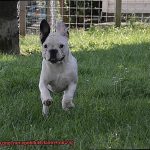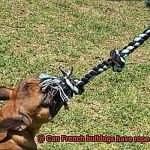Can French Bulldogs hurt you?
French Bulldogs, those pint-sized bundles of cuteness, have taken the world by storm with their compact frames and undeniable charm. These little darlings are known for their playful personalities and unwavering affection, stealing hearts left and right. But amidst all the adoration, it’s crucial to acknowledge the potential risks that come with owning a furry friend. Surprisingly enough, there are legitimate concerns about whether French Bulldogs can cause harm—both physically and emotionally—to their owners.
In this eye-opening blog post, we’ll embark on a journey to uncover these concerns in a way that’s balanced and informative. By delving into various aspects of French Bulldog behavior, health considerations, and management techniques, we aim to equip you with a comprehensive understanding of the potential risks that come hand in paw with owning one of these delightful companions. While it’s important to maintain a realistic perspective, it’s equally vital to celebrate the joys and rewards that come from being a responsible French Bulldog owner.
So let’s strap on our detective hats and unravel the truth behind the burning question: Can French Bulldogs truly hurt you?
Why French Bulldogs Might Pose a Risk
Contents
- 1 Why French Bulldogs Might Pose a Risk
- 2 The Size Factor of French Bulldogs
- 3 Temperamental Differences in French Bulldogs
- 4 Socialization and Training for French Bulldogs
- 5 Potential Health Issues in French Bulldogs
- 6 Monitoring Your Dog’s Behavior for Warning Signs
- 7 Providing a Safe Environment for Your Dog
- 8 Responsible Ownership of a French Bulldog
- 9 Conclusion
However, there are certain factors that might pose a risk when owning a French Bulldog. In this blog post, we will explore why French Bulldogs might pose a risk and provide valuable insights to help owners ensure the safety and well-being of their furry companions.
Size doesn’t matter, but strength does:
Despite their small stature, French Bulldogs possess a sturdy and muscular build, making them deceptively strong. If not properly trained or socialized, their strength can potentially cause harm to themselves or others.
The bite force factor:
French Bulldogs may be small, but they have a surprisingly strong bite force. While they are generally gentle and affectionate, it’s important to be aware that biting or nipping incidents can occur, especially if they feel threatened or scared.
Brachycephalic syndrome and its impact on behavior:
One of the unique characteristics of French Bulldogs is their brachycephalic skull structure, which includes a shortened muzzle and flat face. Unfortunately, this charming feature comes with potential health issues that can affect their behavior and increase the risk of aggression. Breathing difficulties associated with this syndrome can cause agitation and irritability in French Bulldogs, leading to potential aggressive behavior.
The prey drive factor:
French Bulldogs have a strong prey drive, meaning they have an instinctive desire to chase after smaller animals or even children. This can pose a risk if they are not properly trained or supervised. It’s important to establish clear boundaries and provide appropriate training to redirect this natural behavior.
Signs of aggression should never be ignored:
While French Bulldogs are generally known for their friendly nature, any dog has the potential to become aggressive if they feel threatened or scared. It is crucial for owners to be vigilant and address any signs of aggression, such as growling, snapping, or biting, immediately. Seeking professional guidance is recommended in such cases.
Lack of proper socialization and training can contribute to the risk of French Bulldogs exhibiting aggressive behavior. Early socialization with other dogs, animals, and people can help them develop positive interactions and reduce the likelihood of aggression. Basic obedience training is also crucial for establishing boundaries and teaching commands that can redirect any unwanted behavior.
The Size Factor of French Bulldogs
French Bulldogs are small-sized dogs with a compact and muscular build. Standing at about 11 to 12 inches tall at the shoulder and weighing between 16 to 28 pounds on average, these little pooches pack a surprising amount of strength into their petite frames. Let’s take a closer look at the size factor of French Bulldogs, including their build, suitability for apartment living, and potential risks associated with their small size.
Build: Sturdy and Solid
Despite their small size, French Bulldogs have a sturdy and solid frame. Their body is well-balanced, with a broad chest, strong legs, and a thick neck. This gives them an athletic appearance, despite their compact stature. Their muscles are well-developed, which contributes to their strength and agility.
Suitability for Apartment Living: The Perfect Fit
Due to their compact size, French Bulldogs are often considered an excellent choice for apartment living. Their small stature makes them suitable for both indoor and outdoor activities. They don’t require as much space as larger breeds, making them more adaptable to smaller living spaces.
Furthermore, French Bulldogs are generally not excessively energetic dogs. While they do enjoy walks and playtime, they are also content to lounge around and relax indoors. This makes them well-suited for apartment dwellers who may not have access to large yards or outdoor spaces.
Potential Risks: Handle with Care
It is essential to be aware that their size can also pose certain risks and potential for injury. Here are some common risks associated with the small size of French Bulldogs:
- Respiratory Issues: French Bulldogs have a relatively short nose and flat face, which can lead to respiratory issues. Their brachycephalic syndrome makes them prone to breathing difficulties and overheating. It’s important to provide them with proper ventilation and avoid exposing them to hot or humid environments.
- Joint Problems and Back Issues: The compact structure of their body can also lead to joint problems and back issues. French Bulldogs may be prone to spinal disorders like intervertebral disc disease (IVDD) due to their short legs and long back. Regular exercise, a balanced diet, and proper weight management can help minimize the risk of these conditions.
- Vulnerability to Accidents: French Bulldogs’ small size makes them vulnerable to accidental falls or injuries during rough play or unsupervised interactions with larger dogs. It’s crucial to supervise their interactions with other dogs and provide a safe environment for them to prevent any accidents or injuries.
In conclusion, French Bulldogs may be small in size, but they possess a surprising amount of strength and agility. Their compact build makes them well-suited for apartment living, but it’s important to be aware of the potential risks associated with their size. By understanding and addressing these risks, you can ensure the safety and well-being of your furry French Bulldog companion.
Temperamental Differences in French Bulldogs
French Bulldogs are known for their friendly and affectionate nature, but just like humans, each Frenchie has its own unique personality. Understanding these temperamental differences can help you build a stronger bond with your furry friend and create a harmonious living environment. So, let’s dive into the world of Frenchie temperaments.
- Dominant vs. Submissive: French Bulldogs, despite their small size, can exhibit dominant or submissive traits. Some may be assertive and confident, while others may be more laid-back and easygoing. Knowing your Frenchie’s temperament will help you tailor your training approach. A more dominant Frenchie may respond well to firm boundaries and consistent training, while a submissive one may thrive with gentle guidance and reassurance.
- Interactions with Others: Your Frenchie’s temperament also affects how they interact with other animals and people. Some Frenchies may display aggression or territorial behavior towards other pets, while others may be sociable and accepting. Proper socialization from an early age is crucial in shaping their behavior and helping them develop into well-rounded dogs.
- Research and Lifestyle Fit: When considering bringing a French Bulldog into your life, it’s important to research the breed’s typical temperament traits. Understanding how these traits align with your lifestyle and preferences will help ensure a good match between you and your Frenchie. Remember, a happy Frenchie is a well-matched Frenchie.
- Be Mindful of Warning Signs: While French Bulldogs are generally not aggressive by nature, any dog can react if they feel threatened or fearful. Pay attention to signs of discomfort or stress in your Frenchie, such as growling, snapping, or excessive barking. These behaviors indicate that your Frenchie is anxious or threatened and should be addressed promptly.
- Training and Socialization: Training and socialization play vital roles in shaping your Frenchie’s temperament. Early exposure to various environments, people, and animals will help them become confident and well-behaved companions. Remember, a well-trained Frenchie is a happy Frenchie.
By understanding and respecting the temperamental differences in French Bulldogs, you can create a loving and safe environment for both yourself and your furry companion. So, embrace your Frenchie’s unique personality, tailor your approach, and enjoy the wonderful bond you’ll share with your four-legged friend.
Socialization and Training for French Bulldogs
French Bulldogs are known for their adorable and affectionate nature, but like any other dog breed, they require proper socialization and training to become well-behaved and non-aggressive companions. In this section, we will explore the importance of socialization and training for French Bulldogs and provide expert insights and tips based on firsthand knowledge and experiences.
Socialization: Building Confidence and Positive Interactions
Socialization is a critical aspect of raising a French Bulldog. It involves exposing them to various people, animals, environments, and situations in a positive and controlled manner. The goal is to help them develop confidence and learn how to interact appropriately with others.
- Early Start: Ideally, socialization should begin during the critical period between 3 to 14 weeks of age. This is when puppies are most receptive to new experiences. However, it’s never too late to start socializing your French Bulldog.
- People: Introduce your French Bulldog to different people of different ages, ethnicities, and appearances. This can include inviting friends over, taking them for walks in busy areas, or enrolling them in puppy socialization classes. The goal is to expose them to as many positive experiences as possible, so they learn that new people are not a threat.
- Animals: Expose your French Bulldog to other friendly dogs through supervised playdates or visits to dog-friendly parks. Monitor their interactions and intervene if any aggressive behavior is displayed. Positive experiences with other animals help them learn how to communicate and interact appropriately.
- Environments: Take your French Bulldog on car rides, walks in the park, or visits to outdoor cafes. Exposing them to different sights, sounds, and smells helps prevent fear or anxiety-related behaviors when encountering new environments later in life.
Training: Building Good Manners and Obedience
Training is another crucial aspect of raising a well-behaved French Bulldog. It includes teaching basic obedience commands and ensuring they have good manners around people and other animals.
- Basic Obedience: Start training early and focus on teaching commands such as sit, stay, come, and leave it. Use positive reinforcement techniques like treats and praise to reward desired behaviors. Keep training sessions short, frequent, and fun to maintain their interest and attention.
- Good Manners: Teach your French Bulldog not to jump on people, not to pull on the leash during walks, or not to bark excessively. Consistency and positive reinforcement are key in ensuring they understand what is expected of them.
- Advanced Training: Consider enrolling your French Bulldog in more advanced training classes such as agility or obedience competitions. These activities provide mental stimulation and strengthen the bond between you and your furry companion.
Potential Health Issues in French Bulldogs
It’s important to be aware of the potential health issues that these lovable pooches can face. In this article, we’ll dive into the common health problems that French Bulldogs are prone to and discuss how you can prevent or manage them, ensuring your furry friend lives a happy and healthy life.
Brachycephalic Syndrome:
French Bulldogs’ unique facial structure can lead to respiratory difficulties, particularly in hot and humid weather. To keep your Frenchie comfortable, provide them with plenty of cool water, avoid strenuous exercise during peak temperatures, and ensure they have access to well-ventilated areas.
Allergies:
Just like humans, French Bulldogs can develop allergies too. Keep an eye out for symptoms such as excessive itching, redness, or gastrointestinal issues. Consult your veterinarian to identify the allergens causing the reactions and discuss appropriate treatment options, which may include dietary changes or allergy medications.
Genetic Disorders:
French Bulldogs are prone to genetic conditions such as hip dysplasia, patellar luxation, and intervertebral disc disease. Regular veterinary check-ups are essential to catch these issues early on. Additionally, maintaining a healthy weight through a balanced diet and regular exercise can help alleviate stress on joints and reduce the risk of developing these conditions.
Obesity:
The combination of their love for food and a sedentary lifestyle puts French Bulldogs at risk of obesity. To keep your Frenchie fit and trim, provide them with a nutritious diet tailored to their needs and engage in regular exercise appropriate for their age and physical condition.
Skin Problems:
French Bulldogs’ adorable wrinkles can sometimes become a breeding ground for bacteria and lead to skin infections or dermatitis. Regularly clean and dry their skin folds, and consult your veterinarian for specific guidance on grooming products that are safe for your Frenchie.
Heatstroke:
Due to their brachycephalic build, French Bulldogs struggle with regulating their body temperature efficiently. Avoid exercising them during extreme temperatures, provide shade and fresh water, and never leave them in a hot car. If your Frenchie shows signs of heatstroke, such as excessive panting or collapsing, seek immediate veterinary attention.
Monitoring Your Dog’s Behavior for Warning Signs
Here, we will discuss why monitoring your French Bulldog’s behavior is crucial, the common warning signs of aggression, and the necessary steps to address these behaviors.
Why is it important to monitor your French Bulldog’s behavior?
- Safety: Aggressive behavior in dogs can pose a risk to themselves, their owners, and other animals or people they come into contact with. By monitoring their behavior, you can identify potential issues before they escalate.
- Early intervention: Recognizing warning signs allows you to address the problem early on and prevent it from becoming a habit or escalating into a dangerous situation.
Common warning signs of aggression:
- Excessive growling or snarling: If your French Bulldog starts growling at you or others, it may indicate aggression or discomfort.
- Snapping or biting: Any attempt to bite or aggressive mouthing should be taken seriously and addressed immediately.
- Changes in body language: Watch out for signs such as stiffness, tension, raised hackles, or a defensive posture, as these may indicate feelings of threat or agitation.
- Lunging or charging: If your French Bulldog displays sudden movements towards people or other animals, it could be a sign of aggression.
- Dominance-related behaviors: Standing over others or guarding resources like food or toys can also be signs of potential aggression.
Taking action:
- Consult a professional: If you notice any aggressive behaviors in your French Bulldog, seek guidance from a professional dog trainer or behaviorist with experience in dealing with aggression issues.
- Environmental management: Create a safe and structured environment for your dog by providing appropriate boundaries and supervision.
- Training and socialization: Proper training and socialization play a crucial role in preventing aggressive behavior. Regular obedience training and positive reinforcement techniques can help your French Bulldog develop good behavior.
Monitoring your French Bulldog’s behavior for warning signs of aggression is essential for maintaining a safe and harmonious environment. By being proactive and addressing any potential issues early on, you can ensure the well-being of your dog and those around them.
Remember, seeking professional guidance when needed is crucial for effectively managing and resolving aggression issues in your French Bulldog.
Providing a Safe Environment for Your Dog
French Bulldogs are known for their adorable wrinkled faces and playful personalities. However, it’s important to remember that they are still dogs with their own set of instincts and behaviors. As responsible dog owners, it is our duty to provide a safe environment for our furry friends. In this blog post, we will explore the importance of creating a safe haven for your French Bulldog and provide you with practical tips to keep your pup out of harm’s way.
Secure Your Home and Yard:
French Bulldogs have a curious nature and love to explore their surroundings. To prevent them from wandering off and potentially encountering dangerous situations, it is essential to secure your home and yard. Install fences or gates to create a barrier that keeps your pup within the boundaries of safety.
Create Designated Areas:
Just like humans, dogs need their own space to feel secure and comfortable. Set up a cozy crate or designate a specific room where your French Bulldog can retreat when they need some alone time. Having a safe space they can call their own helps reduce anxiety and stress.
Keep Harmful Substances Out of Reach:
French Bulldogs may be tempted to chew on household items, but some substances can be toxic to them. Store cleaning products, medications, and other potentially harmful substances in secure cabinets or high shelves. This simple step can prevent accidental poisoning and keep your pup safe.
Ensure Access to Fresh Water:
Dehydration can lead to serious health issues for French Bulldogs. Make sure to provide a clean water bowl that is easily accessible for your dog at all times. Check the water level regularly and refill as needed to keep your pup well-hydrated.
Exercise Safely:
Regular exercise is important for your French Bulldog’s overall well-being, but it must be done in a safe manner. Avoid extreme weather conditions such as scorching heat or freezing cold, as this can put your pup at risk for heatstroke or hypothermia. Opt for early morning or evening walks when temperatures are more moderate. And don’t forget to keep your French Bulldog on a leash to prevent them from running into traffic or getting into fights with other dogs.
Socialize, Socialize, Socialize:
Proper socialization is key to raising a well-behaved and friendly French Bulldog. Introduce your pup to different people, animals, and environments gradually and positively. This will help them develop good behavior and reduce the likelihood of aggressive tendencies.
Responsible Ownership of a French Bulldog
When it comes to owning any dog breed, including French Bulldogs, responsible ownership is of utmost importance. Not only does it ensure the well-being and happiness of your furry friend, but it also helps prevent any potential harm or injuries to both you and others.

Training and Socialization
Proper training and socialization play a significant role in responsible ownership. Training helps establish boundaries and teaches your French Bulldog basic commands, preventing them from engaging in aggressive behavior or causing unintentional harm. Socialization exposes them to different environments, people, and animals, making them more comfortable and less likely to react negatively or aggressively.
Exercise and Mental Stimulation
French Bulldogs have a moderate energy level and need regular exercise to prevent destructive behavior. Providing them with daily walks, playtime, and mental stimulation not only keeps them physically healthy but also prevents obesity, which can lead to various health issues.
Health Care and Regular Vet Check-ups
Ensuring proper health care for your French Bulldog is crucial. Regular vet check-ups, vaccinations, and preventive treatments for parasites are essential. These visits can help detect any underlying health issues early on and prevent them from escalating into more serious problems that may cause pain or aggression.
Understanding Breed Characteristics
French Bulldogs have specific breed characteristics that owners should be aware of. Their brachycephalic (flat-faced) nature can make them more prone to respiratory problems or heat intolerance. By understanding these characteristics, owners can take necessary precautions to minimize any potential risks or harm.
Safety Measures at Home
Creating a safe environment for your French Bulldog at home is vital. Secure fences or gates to prevent escape, keep harmful substances out of reach, and provide a designated area for them to play and relax. Additionally, supervise interactions between your French Bulldog and children or other pets to avoid any accidents or injuries.
Responsible Breeding Practices
When considering getting a French Bulldog, it is essential to choose reputable breeders who prioritize health and temperament. By doing so, you can reduce the chances of getting a dog with inheritable health issues or behavioral problems that may result in harm to themselves or others.
Em5WE9QFfa0″ >
Conclusion
In conclusion, it is important to remember that while French Bulldogs are generally gentle and affectionate animals, they still have the potential to cause harm.
Despite their small size and adorable appearance, French Bulldogs possess a strong bite force that can inflict injuries if provoked or mishandled. It is crucial to approach these dogs with caution and respect their boundaries.
Additionally, proper training and socialization are key in preventing any aggressive behavior from developing.




